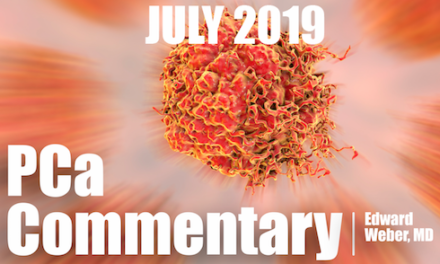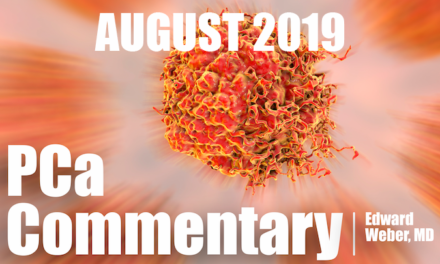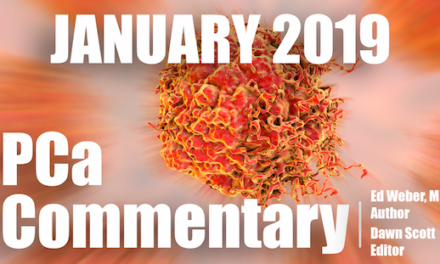
PCa Commentary | Volume 144 – August 2020
Posted by Edward Weber | August 2020
THE CHECKPOINT INHIBITORS – In Search of a Role in the Treatment of Prostate Cancer: The Current Status.
The promise of benefit from immunotherapy for prostate cancer is substantial, but has yet to be fulfilled. Research and a better understanding of the underlying immunology suggests its potential may soon be realized.
The lackluster performance of checkpoint inhibitors in treating prostate cancer is in sharp contrast to substantial responses for these agents in the treatment of melanoma, small cell lung cancer, and urothelial cancer. The explanation of the difference seems largely to relate to the paucity of antigen targets on prostate cancer for attacking T-cells. Responsive tumors present abundant antigens to elicit immunologic attack.
In the early stages of prostate cancer, the low level of antigen targets for T-cells has led to labeling prostate cancer a ‘cold’ tumor. But in the later stages of the disease, following multiple treatments with androgen deprivation, chemotherapy, and agents blocking the androgen receptor, the mutational load of antigens increases. This makes metastatic castration resistant prostate cancer (mCRPC) more susceptible to immunologic control.
Basic Immunology:
All types of cancer defend themselves from lethal attack by activated T-cells by expressing the molecule PD-L1 (programed death ligand 1). This ligand seeks and attaches (‘ligates’) to receptors on T-cells, termed PD1 (programed death receptor 1). This mating inactivates the T-cell’s killing function. The interaction occurs within the tumor and its surrounding microenvironment. The ligation of PD-L1 to PD1 is the ‘checkpoint’ for which the ‘checkpoint inhibitors’ are named.
There are two types of inhibitors, each binding to its specific target. The immune checkpoint inhibitors specific for PD-L1 (e.g. prebrolizumab and novolumab) are monoclonal antibodies that bind with PD-L1 and defunctionalize it. The alternative antibodies, atezolizumab, avelumab and durvalumab, bind with the PD1 receptors and shield the T-cell from being inactivated by the PD-L1 ligand. This frees the T-cell to perform its killing function. Independent of its role in cancer, the function of the PD1 receptor is to protect the host from harmful autoimmunity (The suffix ‘mab’ designates a monoclonal antibody).
Trials of Immune Checkpoint Inhibitors in Advanced Metastatic Castration Resistant Prostate Cancer:
In the Keynote-028 trial, the checkpoint PD1 inhibitor, pembrolizumab (Ketruda), was used in 23 heavily pretreated patients. Partial responses were seen in 17%; progression-free survival was 3.5 months and overall survival 7.9 months. In another trial, Keynote-199, pembrolizumab effected a 22% response in men with bone predominant metastatic disease; median overall survival was 14 months. In a third trial durvalumab (a PD-L1 inhibitor) was combined with the PARP inhibitor Oliparib. Of 19 patients, 44% had a 50% decline in PSA.
However, those men exhibiting BRCA2 mutations had an 82% response rate. Many responding men experience durable responses that persist after the discontinuation of the drugs.
The checkpoint inhibitors are well tolerated, having fewer adverse effects than chemotherapy. Side effects include fatigue, diarrhea, rash, suppressed thyroid function, and a variety of inflammatory conditions, mostly reversible.
Human Gut Bacteria (the gut microbiome) Significantly Affects the Immune System:
The composition of the gut microbiome influences the effectiveness of checkpoint inhibitors – both positively and negatively.
“Recently, research has generated paradigm shifts in concepts about the interactions between bacteria and cancer therapeutic drugs … Conceptually, these findings suggest that bacteria mediated interactions with the immune system are essential for optimal drug efficiency” Jobin, Science, Jan 2018. In the same issue two research articles reported that in melanoma patients responses to checkpoint inhibitors were dependent on favorable gut microflora enhancing T-cell function. They found that antibiotics in these patients disrupted this relationship and were associated with poor responses to PD-1 blockage. Both articles demonstrated that patients can be stratified into responders and no-responders to immunotherapy on the basis of the composition of their intestinal microbiome (Ibid, Jobin). Research has not reached the point where specific bacterial augmentation can be implemented.
Current Clinical Trials: (Two examples of trials using combination therapy).
1) Keynote 365 (NC02861573) studies men with mCRPC employing different drug combinations all combined with pembrolizumab (‘Ketruda’, a PD1 inhibitor): pembrolizumab with olaparib (a PARP inhibitor, ‘Lynparza’); with docetaxel/prednisone; with enzalutamide; or abiraterone+prednisone. The trial is currently recruiting patients.
2) Checkmate 9KD studies men with mCRPC with nivolumab (‘Opdivo’, a PD1 inhibitor) combined with rucaparib (‘Rubraca’, a PARP inhibitor); or with docetaxel, or enzalutamide. This trial is also recruiting.
The Broad View:
In the excellent review, PD-1/PD-L1 pathway inhibitors in advanced prostate cancer, Expert Review of Clinical Pharmacology, 2018, Emmanuel Antonarakis, a well-recognized prostate cancer researcher, offered the opinion “The advent of PD-1/PD-L1 inhibitors may be the biggest advance in cancer care in the last decades.” He acknowledges that “these drugs do not appear to have great efficacy in unselected patients” but improved responses can be seen in subgroups of patients with aggressive cancers showing high expression of PD-L1 and men who “have progressed on antiandrogen therapy (especially enzalutamide) and tumors that harbor germline or somatic DRD mutations” i.e. mutations in the BRCA family. He sees the future of immune checkpoint inhibitors as being combined with chemotherapy, radiation and antiandrogen therapy, and in patients with DNA damage repair mutations combined with PARP inhibitors. His estimate is that possibly 1/3 of men with mCRPC would be candidates for checkpoint immunotherapy.
BOTTOM LINE:
The immune checkpoint inhibitors targeting PD-L1 and PD-1 are changing the management of prostate cancer, having shown significant benefit in selected patients, in those with heavy mutational loads and/or harboring mutations in the BRCA family. The future of their use is bright and likely lies with combination therapy with other agents.
Your comments and requests for information on a specific topic are welcome e-mail ecweber@nwlink.com.
Please also visit https://prostatecancerfree.org/prostate-cancer-news for a selection of past issues of the PCa Commentary covering a variety of topics.
“I want to thank Dawn Scott, Staffperson, Tumor Institute Radiation Oncology Group, & Mike Scully, Librarian, Swedish Medical Center for their unfailing, timely, and resourceful support of the Commentary project. Without their help this Commentary would not be possible.”
ABOUT THE AUTHOR
Edward Weber, MD, is a retired medical oncologist living in Seattle, Washington. He was born and raised in a suburb of Reading, Pennsylvania. After graduating from Princeton University in 1956 with a BA in History, Dr. Weber attended medical school at the University of Pennsylvania. His internship training took place at the University of Vermont in Burlington.
A tour of service as a Naval Flight Surgeon positioned him on Whidbey Island, Washington, and this introduction to the Pacific Northwest ultimately proved irresistible. Following naval service, he received postgraduate training in internal medicine in Philadelphia at the Pennsylvania Hospital and then pursued a fellowship in hematology and oncology at the University of Washington.
His career in medical oncology was at the Tumor Institute of the Swedish Hospital in Seattle where his practice focused largely on the treatment of patients experiencing lung, breast, colon, and genitourinary cancer and malignant lymphoma.
Toward the end of his career, he developed a particular concentration on the treatment of prostate cancer. Since retirement in 2002, he has authored the PCa Commentary, published by the Prostate Cancer Treatment Research Foundation, an analysis of new developments in the prostate cancer field with essays discussing and evaluating treatment management options in this disease. He is a regular speaker at various prostate cancer support groups around Seattle.





